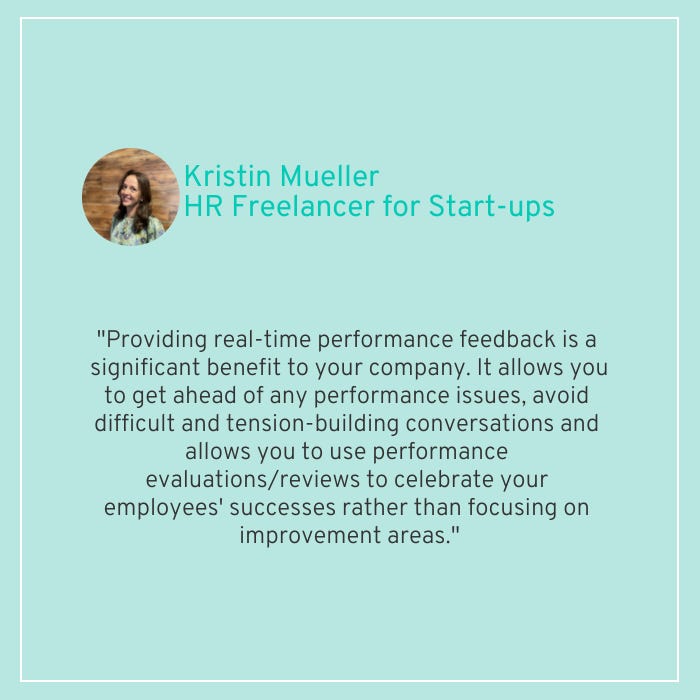Unlocking the Power of Efficient & Meaningful 1:1's
Prioritizing 1:1 Meetings in the start-up world
In today's fast-paced business world, it can be challenging to prioritize one-on-one meetings (1:1s) between managers and employees. However, regular 1:1 meetings are a critical component in building a strong workplace culture. Unfortunately, 1:1s can often become an afterthought, with managers focusing heavily on tasks and to-do lists instead of cultivating meaningful relationships and conversations with their team.
As an experienced HR professional, I've seen many managers struggle with holding productive and valuable 1:1s. They may avoid them altogether or find their attempts unproductive. Conflicting priorities can lead to scheduling conflicts and missed 1:1 meetings, often referring back to an "open-door policy" where employees can come to their manager with any issues whenever they need to.
Some managers struggle with active listening, clear and concise communication, and the ability to give and receive feedback - making them more likely to push out 1:1 meetings. They may also be uncomfortable with conflict or unsure how to handle difficult conversations with their direct reports.
Then, some managers lack a personable demeanour and shy away from small talk, unsure what to discuss if it's not work-related.
Managers need to understand that building rapport with employees is critical to creating a positive and productive work environment, and 1:1s are an invaluable opportunity to do so.
As a manager, here are the three simple things you need to do:
1: Schedule the 1:1 meeting.
2: Treat this meeting as sacred and establish the tone.
3: Prioritize the 1:1 meeting.
Your direct report is responsible for the following:
1: Preparing the agenda items
2: Driving the conversation
3: Taking notes and following through on action items
Now that you have a grasp of the importance of 1:1 meetings and the three key responsibilities you hold as a manager, let's dive deeper into how to make these meetings genuinely effective and meaningful.
Here are some expert tips:
Don’t miss a meeting
Adhere to the schedule and prioritize these meetings to the utmost extent. If a reschedule is necessary, aim to do it within the same week. If you find yourself repeatedly rescheduling, consider setting a new weekly date and time to ensure that you can honor your commitment.
Prioritize
Treating 1:1 meetings with your employees as a priority, similar to any other important task or meeting, can help your employees feel valued and appreciated, enabling you to establish stronger relationships with them.
Decide on a meeting frequency
The frequency of 1:1 meetings should be tailored to individual employee preferences. For example, a junior employee with many responsibilities may require more frequent meetings than a senior employee with more experience. Discuss with your employees to see which frequenecy each of them prefer.
Time of day
Schedule 1:1s at times when you are less productive in the day to ensure you’re not putting deep work time on hold. Avoid scheduling all your 1:1 meetings on the same day to prevent burnout.
Have an agenda
Using a consistent structure for each 1:1 meeting can ensure that your employees are adequately prepared and that the meeting remains on track. You can refer to the suggested agenda at the bottom of this post. While it's crucial to keep these meetings short and focused in a start-up environment where time is limited, avoid overemphasizing them as a to-do list. Use your judgment and assess the situation accordingly.
Switch up the location
Consider having off-site meetings, such as grabbing a coffee, to create a more relaxed environment and encourage open conversation. This approach is particularly beneficial for managers who struggle to connect with their employees on a more personal level. Allow the conversation to flow naturally and organically which leads to more productive and meaningful discussions. These discussions can also provide a space for personal development, which can enhance employee engagement and retention.
Provide real-time feedback
Providing real-time performance feedback is a significant benefit to your company. It allows you to get ahead of any performance issues, avoid difficult and tension-building conversations, and allows you to use performance evaluations/reviews to celebrate your employees' successes rather than focusing on improvement areas.
Do a pulse-check
Conduct a pulse check to determine how engaged your employee is. If you sense they're consistently disengaged, address it with them and determine what they require from you. You may either mitigate the risk of them leaving or proactively engage in succession planning.
Offer your complete attention
There's nothing quite as frustrating as being in a 1:1 meeting with someone who is glued to their phone or continuously checking notifications on their watch. By choosing to leave your phone aside, you can set the right tone and demonstrate your respect for the person you're meeting with.
Follow up on your action items
Following each 1:1 meeting, follow up on any action items or commitments made by you during the session. This demonstrates that you value your employee's time and are committed to supporting their growth.
Effective 1:1 meetings are crucial for building a productive and engaged team in a startup environment. As a manager, you might be worried about adding more tasks to your already full plate, but don't worry! By proactively scheduling regular meetings, keeping them focused, maintaining a consistent structure, encouraging open communication, and promptly following up on action items, you can optimize your limited time and help your employees succeed.
I hope I have demonstrated that 1:1 meetings don't have to be a daunting task for managers. They can be an effective and efficient way to build relationships with your team and foster a culture of growth and success.
Don't close this tab just yet! Take the following two steps (right now) for each of your direct reports:
Schedule recurring 1:1 meetings
Incorporate this agenda into the meeting invite:
Personal check-in
Review of outstanding items from the previous week
Current work progress
Status update on goals and objectives
Do you need any assistance from me?
Doing so will establish a foundation for meaningful and effective 1:1 meetings that can help your team succeed.



